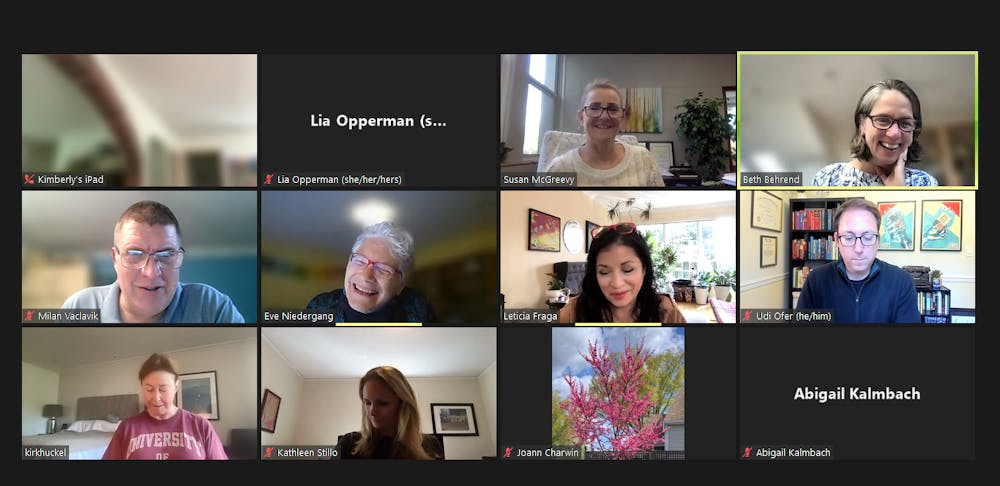In Thursday’s virtual Cannabis Task Force (CTF) meeting, the committee focused on drafting an ordinance of the CTF’s recommendations when it comes to cannabis licenses and dispensaries in Princeton, as well as the research, criteria, tax revenue, education, and equity behind it.
Councilmember Eve Niedergang GS ’85 stated that the purpose of the ordinance is to “answer where [the CTF] is on key recommendations, respond to comments from the public so far, and address concerns from those who believe it raises crime rates.”
This will be the first public document that the CTF distributes.
Councilmember and Visiting Lecturer at of Public and International Affairs Udi Ofer stated that “[the document] will be scrutinized, rightfully so.” He also expressed concerns that the document “should be explicit” so that it deals with issues that are on the top of many Princeton residents’ minds.
The main issue that came up during the meeting was how many licenses should be offered in the town of Princeton. In a prior meeting, the CTF decided on three licenses but plans to be selective in choosing retailers for the town.
Niedergang expressed concerns that “three [licenses] might not provide competition,” and that having one to two licenses would create more competition.
Councilmember Milan Vaclavik said the longer the CTF waits to make a recommendation for adult use retail, the likelier it is that retailers will go to different communities.
Councilmember Hugh O’Beirne added that elsewhere in the state, Hackensack currently has one planned dispensary but four applicants, and New Brunswick has three planned dispensaries and 10 applicants. He said he believes that, considering the state application is not available yet, fewer applicants are applying.

Councilmember Colleen Exter added, “if Princeton decides to go for a micro license, it would open up the opportunity for more applicants.”
Another prominent issue raised during the meeting is whether or not it has been challenging for those who want to open a dispensary in town to find a location or find someone willing to lease to them.
Councilmember Andrew Siegel stated, “landlords are completely mixed,” with some having no interest in renting to cannabis dispensaries and some being “gung ho” about the idea. He said he believes that many landlords are “50/50” on the issue.
Councilmember Abigail Kalmbach added that many retailers and landlords “don’t want to deal with cannabis.”

Siegel wrote in the Zoom chat that “some who say they don’t want to do it because of the stigma behind it, but more importantly there’s an operational aspect … cash only, security, build-outs, insurance, lots to think about for potential landlords.”
In the meeting, Kalmbach explained how if a potential dispensary location is mortgaged, the bank needs to sign a lease and that national banks won’t allow the space to be leased to a “plant-touching” business.
Ofer advocated for the CTF to engage with landlords and realtors on this, and bring the issue “out of the shadows.”
The CTF voted as a quorum and maintained its previous sentiment that all dispensaries should be at least 200 feet from schools, with nine out of 12 members agreeing with this recommendation.
Another issue voted on was whether or not there should be an added requirement of only one cannabis business per zone. Seven council members approved of this motion; however, the committee will wait until the next meeting to finalize the motion.
Members also discussed whether or not the committee should remove from the ordinance draft a provision dictating that tax dollars from dispensaries be used for social or restorative justice.
Ofer stated that the reason Gov. Phil Murphy legalized marijuana is the recognition that the War on Drugs has failed and created a devastating impact on communities. Ofer said that having a section in the draft explaining the intent to tie the revenue stream from marijuana sales to address the War on Drugs “gives a moral high ground” to the committee and “shields [the CTF] of the public being critical of our decision.”
This issue will be voted on during the next meeting.
The last issue discussed was whether or not the CTF should continue to solely focus on offering retail licenses or look into other license types, either now or in the future. Niedergang stated they “didn’t explicitly exclude other license types but are focusing on retail.”
The council also discussed the possibility of retail licenses offering home delivery and whether or not micro licenses are a viable option.
O’Beirne added that he imagines there will be a requirement that delivery is a separate matter and that they need to see if there’s a problem with vertical integration. He also stated that he’s skeptical of micro licenses, as they “just liberalized licensing in general.”
The CTF will continue to edit the draft of its recommendations at its next meeting on Thursday, Nov. 11.
Lia Opperman is a news contributor for the ‘Prince.’ She can be reached at liaopperman@princeton.edu or @liamariaaaa on Instagram.








